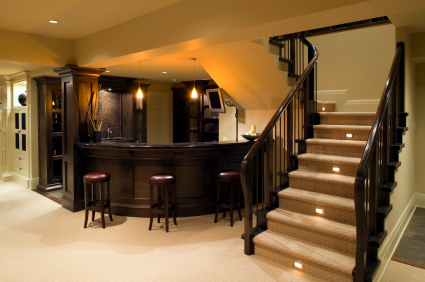Having a finished basement will add value to your home and give you additional living space. Basements are a great choice for an extra family room because they are located under your home – completely out of the way. Lots of people choose to use their basements as play rooms for their children or TV rooms.
F inishing a basement may sound as easy as adding some flooring and furniture. However, you must remember that your basement is underground, which could pose some problems. When choosing flooring for your basement, keep the following tips in mind.
inishing a basement may sound as easy as adding some flooring and furniture. However, you must remember that your basement is underground, which could pose some problems. When choosing flooring for your basement, keep the following tips in mind.
- Be aware of any possible moisture buildup. Since your basement is below ground level, it might have some moisture buildup on the floor. Determine if your basement’s concrete floor gets damp by placing plastic over the floor and sealing it with tape. If moisture builds up underneath the plastic, you have to find the source of the moisture and fix it.
- Be aware of any possible seepage on the walls. While this may not be an extremely damaging factor, if your basement walls do occasionally experience seepage, you need to choose flooring that can withstand some moisture.
- If you have a moisture-proof basement, your flooring options are plentiful. You can add carpeting, vinyl, laminate, hardwood, or tile.
- If your basement is prone to some moisture issues, you should stick with vinyl flooring because it is easier to maintain and resistant to moisture damage. Laminate and hardwood will quickly succumb to damp environments.
- You can always choose to leave your floors uncovered and simply paint or stain the concrete.
- Carpeting is better suited for moisture-proof basements. Water can quickly damage carpeting and the padding, leaving the basement smelling of mold and mildew. If you are adamant about having a carpeted floor, choose carpet tiles with rubber backings.

For all of your Denver Hardwood Flooring needs visit our site today.
Speak Your Mind